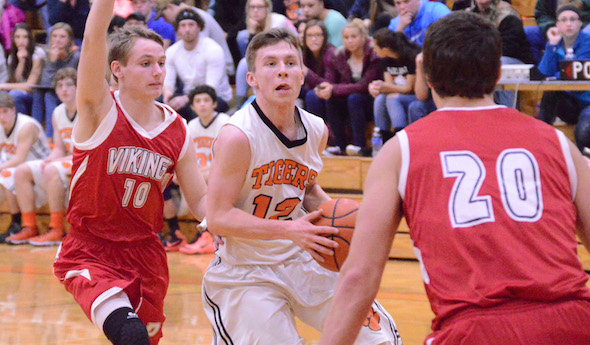
Hillman Becomes Basketball Town, Too
January 6, 2017
By Dennis Chase
Special for Second Half
HILLMAN – Eric Muszynski still remembers that day in 2005 when, as the newly appointed boys basketball coach at Hillman, he made a promise to the man who hired him, administrator Jack Richards.
 As they gazed at the banners in the school gymnasium – highlighted by the school’s three MHSAA Class D championships in baseball – Muszynski vowed to add some basketball banners to the collection.
As they gazed at the banners in the school gymnasium – highlighted by the school’s three MHSAA Class D championships in baseball – Muszynski vowed to add some basketball banners to the collection.
“He (Richards) chuckled,” Muszynski recalled. “He said, ‘Try to get to .500 first.’”
Historically, Hillman’s been a baseball town. The Tigers played for MHSAA championships four times in six years during the 1990s.
“Basketball was something you did to stay in shape for baseball,” said Richards, who went on to serve as superintendent for five years. “Eric’s turned that around.”
Since 2009, Hillman has won four North Star Conference basketball championships, five Districts and one Regional. The Tigers stretched their regular-season win streak to 44 after Thursday night’s 68-38 victory over Mio. Their last regular-season loss was to Cedarville in the 2014-15 opener.
Quite a turnaround for a program that had won only one league title prior to Muszynski’s arrival.
“And that wasn’t an outright title,” senior guard Gunnar Libby said.
Libby, a first-team Associated Press all-state pick last season, is the catalyst for this 5-0 Tigers team. A four-year varsity veteran, Libby has played a vital role in the program’s growth. Hillman won its first outright league title when he was a freshman, captured its first Regional crown when he was a sophomore, and posted its first unbeaten regular season when he was a junior.
“I’ve been really lucky to play on some good teams,” he said.
The turnaround did not happen overnight. The Tigers were 10-32 in Muszynski’s first two years.
“I remember thinking to myself, ‘Will we ever get over that hump?’” Muszynski wondered.
His boss stood by him.
“I had some people come to my office, saying he wasn’t the guy for the job,” Richards said. “I told them, ‘Settle down. This guy will bring us championships.’ Eric heard me, and he took it to heart. He worked hard to prove me right.”
In his third season, Muszynski led Hillman to an 11-10 mark. From there, the program took off.
“It’s been truly amazing,” the former Alpena High School standout said. “As a coach, you envision and hope that your program can do big things. We’ve been in that conversation – of trying to get down to East Lansing (for the Final Four) – since 2013 when we almost upset Cedarville (a double overtime loss) in the Regional Final.”
Hillman, sparked by Mason VanPamel and Ty Jones, reached the Quarterfinals in 2015 before losing to eventual champion Powers North Central.
It looked like the Tigers might be in for a rebuild last season, losing eight seniors and four starters to graduation. Instead, Hillman won its first 22 games before losing to Onaway 58-57 in the District Final.
“We were counted out from the very beginning,” Libby said. “We proved everybody wrong.”
Still, the setback to Onaway – a team Hillman had knocked out of the Districts the previous three years – left a bitter taste. Onaway reached the Quarterfinals, but that loss motivates the Tigers.
When his team first gathered for practice this season, Muszynski stressed the importance of “protecting” its league title as well as recapturing the District championship. Hillman had won three Districts in a row before its sudden exit last March.
“That District (trophy) should be in Hillman,” Libby said.
That statement reflects how far this program has evolved. It’s a program that’s now won 46 consecutive league games and 36 consecutive home games.
Those streaks continue to grow, although Libby admitted he’s lost count.
“You just go out there and do what you’ve got to do,” he said.
The 5-foot-9 Libby is the floor general and lone senior in the starting lineup. He averages 25 points and six assists per game. He surpassed 1,000 career points in the season opener when he dropped 30 on Cedarville.
“He’s lightning quick,” Muszynski said. “He’s a tough kid; a hard-nosed, old school style point guard.”
Libby’s backcourt mate, 5-10 junior Brandon Banks, averages nearly 15 a game.
“That’s been our recipe for success since 2009,” Muszynski said. “We usually feature two dynamic scorers.”
Andrew Funk, a 6-foot junior, is also averaging in double figures. He scored 19 in Tuesday’s win, hitting five of Hillman’s 13 3-pointers.
The Tigers compensate for lack of size with speed, a trapping defense and a dangerous perimeter game. Kory Henigan, a 6-4 sophomore, and Billy Kolcan, a 6-1 junior, are the tallest starters. Henigan averages eight points and seven rebounds while the athletic Kolcan, an MHSAA Finals qualifier in track and an honorable mention all-state player in football, spearheads the press.
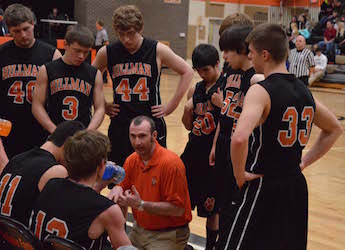 “He (Kolcan) plays up front on our press,” Muszynski said. “He makes us go. He’s one of the best athletes to come through our school in a long time.”
“He (Kolcan) plays up front on our press,” Muszynski said. “He makes us go. He’s one of the best athletes to come through our school in a long time.”
Kolcan, Banks and Funk were on varsity as sophomores last season.
“On paper, it appears we’re young,” Muszynski said. “But we’re battle-tested.”
And, according to Libby, cohesive, too.
“We work well together,” Libby said. “We’re unselfish – and we scrap.”
Now, the Tigers would like to start playing more basketball. Hillman played just three games in December after two contests were postponed due to weather.
“It’s hard to get any kind of rhythm and consistency when you play two games, then you’re off two weeks, you play one game, then you’re off another two weeks,” Libby said.
As for Muszynski, this is his 12th season at Hillman. He was hired as a physical education/health/social studies teacher and girls basketball coach. When the boys job opened soon afterward, he added that to his responsibilities. He coached both teams for two years before the MHSAA switched girls basketball season to the winter. Even though the girls were 30-12 in those two seasons under his leadership, he felt coaching boys basketball was his calling.
“I liked the challenge,” he said. “With the girls, I walked into a good program. With the boys, I wanted to see if I could build a program.”
With a win over Rudyard just before the holiday break, the 37-year-old Muszynski notched his 200th career win at Hillman (30 with the girls, 170 with the boys).
“He’s been a real blessing for us,” Libby said. “He’s a great coach. He holds us all accountable. He’s thorough, and he can motivate. He knows his stuff.”
“I’m truly blessed,” Muszynski added. “That’s (200 wins) a credit to my players, past and present.”
Muszynski echoed those same sentiments after he won the Associated Press Class D Coach of the Year honor last season.
“One of the proudest moments in my coaching career,” he admitted. “Not only was it a great reward, but it was a reflection of our basketball program here.”
Richards, meanwhile, takes satisfaction in the basketball program’s accomplishments. Now retired, he still follows the Tigers – and Muszynski.
What did he see in Muszynski when he hired him in 2005?
“He has a drive,” Richards said. “He knows what it takes and the work that’s involved. A lot of people just want to work during the season, and when it’s over they’re done. That’s not Eric. He’s a worker, a planner. You could see his desire.”
Richards also feared, once the boys started winning, that Muszynski might leave for a bigger school. He even mentioned that to Muszynski.
“Eric said, ‘You gave me the opportunity to be a head coach and I want to do right by you,’” Richards recalled. “I said, ‘I understand that. But let me give you a piece of advice: it’s easier to build a dynasty in a small town than in a large town.’ I think he’s done a pretty good job with that.”
Muszynski looked north to Cedarville for inspiration. Coach Dave Duncan developed that program into a state contender. The Trojans won an MHSAA title in 2007 and nearly another two years later.
“I thought if a small Class D school in the Upper Peninsula can do that, why can’t we?” Muszynski reasoned.
One of Muszynski’s first priorities was to start applying his philosophies in the youth program so by the time those players reached the varsity they would know the defensive schemes and offensive sets.
“They’ve seen success so they know the formula works,” Muszynski said. “If you have some success, and start to win championships, everyone starts to buy in.”
As for baseball? Practice is still several weeks away.
“When I first got there,” Richards recalled, “the kids, after basketball practice, would put their gloves on and throw the baseball around. They even had a batting cage in the old gym. Now, you don’t see a baseball glove in the gym during the winter.”
Now you see basketball banners.
 Dennis Chase worked 32 years as a sportswriter at the Traverse City Record-Eagle, including as sports editor from 2000-14. He can be reached at [email protected] with story ideas for Manistee, Wexford, Missaukee, Roscommon, Ogemaw, Iosco, Alcona, Oscoda, Crawford, Kalkaska, Grand Traverse, Benzie, Leelanau, Antrim, Otsego, Montmorency, Alpena, Presque Isle, Cheboygan, Charlevoix and Emmet counties.
Dennis Chase worked 32 years as a sportswriter at the Traverse City Record-Eagle, including as sports editor from 2000-14. He can be reached at [email protected] with story ideas for Manistee, Wexford, Missaukee, Roscommon, Ogemaw, Iosco, Alcona, Oscoda, Crawford, Kalkaska, Grand Traverse, Benzie, Leelanau, Antrim, Otsego, Montmorency, Alpena, Presque Isle, Cheboygan, Charlevoix and Emmet counties.
PHOTOS: (Top) Gunnar Libby, who has scored more than 1,000 points during his Hillman career, cuts through a group of defenders. (Middle) Hillman coach Eric Muszynski addresses his team. (Photos courtesy of The Alpena News.)
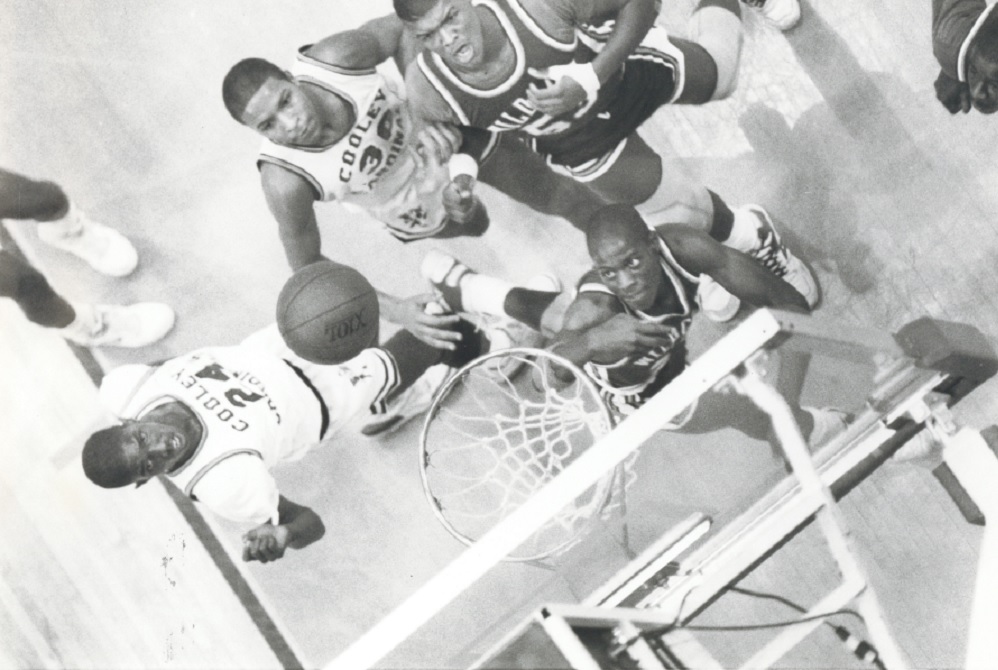
1970-1995: Detroit, Flint Ruled Class A Boys Basketball
By
Ron Pesch
MHSAA historian
March 7, 2022
Geographic domination.
It really hasn’t happened on the basketball court in the MHSAA’s top classification since the mid-1990s.
Class A state titles – designated Division 1 in basketball since 2019 – have bounced around Michigan over the last 25-plus years like, well, an over-inflated wayward basketball. Kalamazoo Central, Pontiac Northern, and Clarkston grabbed back-to-back titles between 1996 and 2021. The Saginaw area locked down five Class A crowns within that stretch; Arthur Hill snagged one in 2006, while Saginaw High immediately followed with two in a row in 2007 and 2008. The Trojans also won in 1996 and 2012. Greater Lansing has three titles – one by Lansing Everett, another by Lansing Waverly, then one by Holt High School – about eight miles outside the city limits.
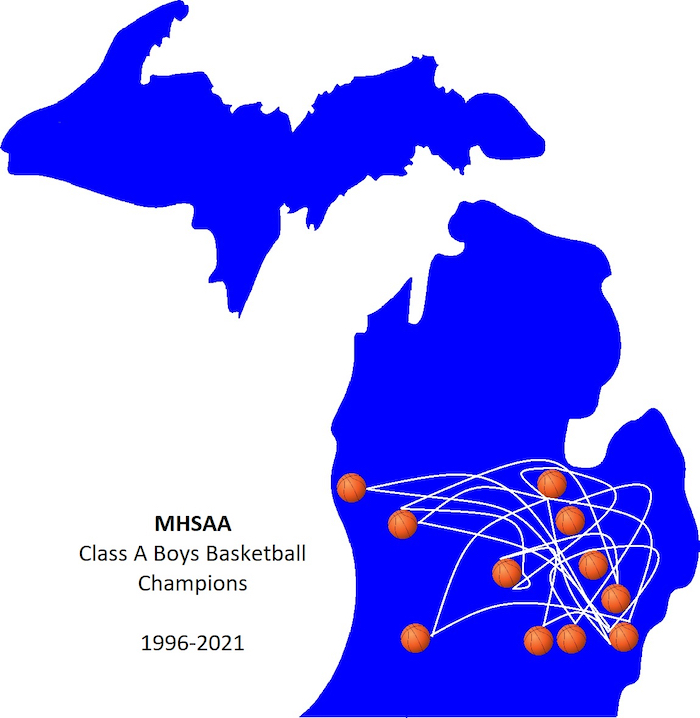 Then it’s single titles to Grand Rapids Ottawa Hills, Rockford, Muskegon, Ann Arbor Pioneer, and Ypsilanti Lincoln. Metro Detroit schools Romulus, Pershing, Central, Western, and U-D Jesuit also have single championships during that span.
Then it’s single titles to Grand Rapids Ottawa Hills, Rockford, Muskegon, Ann Arbor Pioneer, and Ypsilanti Lincoln. Metro Detroit schools Romulus, Pershing, Central, Western, and U-D Jesuit also have single championships during that span.
But from 1970 to 1995, a trip to the Finals to watch the ‘A’ title game meant – with rare exception – you were watching a team from Flint or Greater Detroit. Or both.
Flint: Home of the Vikings
Opened in the fall of 1928, Flint Northern had been the Vehicle City’s top basketball school, winning Class A titles in 1933, 1936, 1939, and 1940 under coach Jim Barclay, then another in 1947 under Les Ehrbright. The Vikings also advanced to the state championship game in 1954 under Carl Stelter, losing to Muskegon Heights in overtime, 43-41.
Then, things went mostly quiet for the next decade and a half.
Jack Marlette was only the fourth varsity basketball coach in school history. Since arriving at Northern in 1949, he had served as head coach in tennis and golf, sophomore coach in basketball and football, junior varsity coach in basketball and football, equipment manager, and head trainer.
Midseason 1955, he replaced Stelter as the varsity basketball coach, when Stelter was named a principal within the Flint school district.
“Marlette coached teams posted a record of 112 victories and 99 defeats,” stated Len Hoyes in the Flint Journal when the coach stepped down in March 1967. “Included are six city championships, two districts, and a Saginaw Valley Conference crown in 1956.” His 1957 team reached the MHSAA Quarterfinals, losing to East Detroit.
With the announcement, Northern wooed 36-year-old Dick Dennis to take his spot come the 1967-68 season. Dennis’ teams had posted an impressive 105-21 varsity record at Alpena High School over seven seasons. Perhaps more impressively, his teams had beaten two of the Flint area’s finest in the MHSAA Regional round in 1966.
Dennis agreed to the move to Northern, “but had one important request,” stated reporter Bruce Johns in the Journal. “He wanted Bill Frieder as the junior varsity coach.”
Frieder, who would ultimately become a legendary basketball figure in Michigan, had landed his first basketball job as JV coach under Dennis at Alpena during the 1965-66 school year.
“… (A) son-in-law of Larry Laeding, former Saginaw High coach and a former player for the Trojans, Freiders (sic) had a 20-11 JV record for two years,” noted the Journal at the time of the hiring. (Laeding’s Saginaw team had won the Class A basketball championship in 1962.)
Dennis’ varsity squad posted an 11-6 record that first year, followed by a 13-6 mark in 1968-69, the program’s best season in 10 years. Frieder’s 1967-68 JV Vikings finished with a 13-3 mark, earning a share of the Saginaw Valley Conference’s title. In his second year, Frieder’s squad went a flawless 16-0.
But a teacher’s strike in Flint the following school year caused Frieder to resign from his position.
“At this point, I want to emphasize that I am highly opposed to teachers’ striking as I feel it sets a poor example for children and such an act reflects upon me personally,” stated Frieder in a letter of resignation to the Flint Board of Education.
Unable to work around it, he stepped aside.
Another shake-up
After three seasons at the helm, in May 1970, Dennis accepted an assistant principal position within the district. Northern administration interviewed nine “capable” candidates for the opening, including the former JV coach.
“Out of the candidates, we felt that Bill was the best qualified,” Northern athletic director Jim Fowler told the Journal’s Dean Howe 22 days later. “Bill is familiar with our situation at Northern, he’s familiar with the kids and unquestionably a fine coach.
“… it was Dennis’s strong recommendation that finally swung the gavel Frieder’s way,” stated Howe.
“Bill has a tremendous ability to get along with the kids,” Dennis had told the Journal in 1969. “… there are some coaches who never accomplish this. Bill’s two outstanding characteristics are his loyalty to the job and kids and his tremendous amount of pride.
“He just loves the game. Bill works just as hard at developing good citizens as he does to winning.”
Under Frieder, the Vikings quickly returned to the state spotlight, winning two straight MHSAA Class A championships in 1971 and 1972.
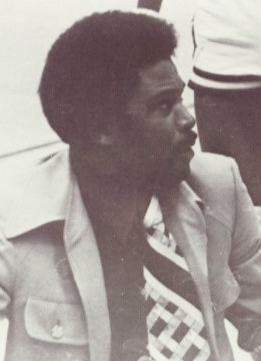 For the first time since 1954, Northern enjoyed final round success. Frieder’s 1971 Vikings, powered by senior Tom McGill and the Britt brothers, Wayman and James, clipped the taller – and favored – crew from Detroit Kettering, led by Lindsay Hairston, 79-78.
For the first time since 1954, Northern enjoyed final round success. Frieder’s 1971 Vikings, powered by senior Tom McGill and the Britt brothers, Wayman and James, clipped the taller – and favored – crew from Detroit Kettering, led by Lindsay Hairston, 79-78.
A year later, Frieder’s team beat Pontiac Central, a squad it had defeated twice during the regular season, 74-71. It was the Vikings’ 33rd-straight victory.
Frieder returned for the 1972-73 season. The Vikings posted an 18-7 record and won a District title. In July, his JV coach from the past two seasons, Grover Kirkland, was named head basketball coach at Flint Northwestern. In August, Frieder resigned. Rumors had been flying that he might go to the University of Michigan as an assistant. A Saginaw native, Frieder stated his “retiring is a result of many things.” Primarily, he planned to return to Saginaw to go into the produce business with his father.
The rumors, it turned out, were true. A little over a month later, the University of Michigan appointed Frieder as assistant basketball coach.
“We think it’s very fine to have a man of Bill’s caliber on our staff,” said Johnny Orr, Michigan’s head men’s basketball coach.
“If at this point in my life, I could describe the job I wanted most, the thing I wanted most to do in my life, this would fit it to a tee,” said Frieder at the time of the announcement.
Bill Troesken, 29, who had stepped down in June of 1973 after three years as varsity coach at Flint Powers Catholic, was hired by Northern to replace Frieder. His team would grab another Class A championship in March 1978.
A Long Drought
Flint’s oldest high school, Flint Central, was opened in 1875. Incredibly, the boys basketball team never won a state title – or even appeared in a championship game – until coach Stan Gooch arrived on the scene.
“Gooch, who starred in basketball at Flint Tech High, Flint Junior College, and Central Michigan (University), began his coaching career as bench boss of the sophomore team at Central High in 1959,” recalled Brendan Savage for MLive in 2008 at the time of his induction into the National High School Athletic Coaches Association Hall of Fame. “He took over the reins of the junior varsity the following year and was promoted to varsity coach in 1966.” Gooch guided Flint Central to its first state championship game in 1967, but Central was trounced by Detroit Pershing, a PSL squad considered by many to be the greatest basketball team in Michigan prep history. Guided by coach Will Robinson, the Doughboys were led on the court by future NBA players Spencer Haywood and Ralph Simpson.
Gooch resigned following the 1967-68 season to become head coach at Flint Junior College (which was converted into a countywide college, and rebranded as Genesee Community College in 1969, then renamed Mott Community College in 1973). After 10 seasons, Gooch stepped down, and within months, he replaced his replacement at Flint Central, Clif Turner, who had guided the program through the 1977-78 season.
Central then won three straight Class A titles from 1981-83, helping to build the legend of Flint basketball.
Then it was Northwestern’s turn. In both 1984 and 1985, Coach Kirkland’s Wildcats beat Detroit Southwestern. With those wins, the Flint city schools had now won six of the last eight titles.
“City of Champions defies explanation” trumpeted the Journal at the end of March 1985, after Northwestern had won Class A and Flint Beecher had won the boys title in Class B.
“No single factor can be pinpointed as the reason Flint has dominated,” wrote Phil Pierson under the headline, “while metropolitan Detroit, an area approximately 10 times larger, has failed to win a Class A Championship since 1979.”
Northwestern’s Glen Rice “became the area’s first recipient of the Mr. Basketball award presented by the Michigan High School Basketball Coaches Association and has been named to the Parade and Basketball Weekly All-American teams. (Beecher’s Roy Marble finished second, while Central’s Terence Greene finished fourth in Mr. Basketball balloting).
Was this success the opportunity to play year-round, asked Pierson. Coaching? The talent on the court?
Other areas across the state featured these same strengths, concluded the writer. “It may just be that the reason for Flint’s success is too obvious to be considered by the philosophers: the cyclical nature of high school sports.
“There was nothing wrong with Flint basketball from 1948-70 when there were no state Class A or B championships. Other teams and programs were just better.”
The Return of the PSL
It took five years after the return to the MHSAA Tournament before the PSL earned a Class A title with that ’67 Pershing squad. The next arrived in 1970, again by Pershing, then in 1973 by Southwestern, and again in 1979 by Mackenzie. Class A was won by Metro Detroit in 1974, by Birmingham Brother Rice, in 1975 by Highland Park, and in 1976 by Detroit Catholic Central.
From 1971 to 1985, Flint’s public school champions had defeated Pontiac Central twice, and PSL teams from Kettering, Murray-Wright, and, famously, Southwestern, on four straight occasions between 1982 and 1985.
On only two occasions between 1975 and 1995 did the Class A crown leave the city of Flint or Metro Detroit. In both instances, it landed in Lansing. In 1977, the Lansing Everett Vikings, led by Earvin Johnson – nicknamed “Magic” by the press – wrestled it away by downing Brother Rice in a 60-56 overtime thriller. In 1980, Lansing Eastern, powered by the state’s first Mr. Basketball winner, Sam Vincent, did the same, with a 64-53 victory over Highland Park.
The Cycle of Basketball
As soon as the ink dried on Pierson’s words, it seems, the cycle rotated.
Romulus took down Southwestern in ’86 before the PSL took control of Class A beginning with the 1987 season. Cooley, coached by Ben Kelso, snagged the first of three straight that year. After finishing as runner-up in seven of the previous eight title games, Southwestern, coached by Perry Watson, grabbed back-to-back victories in ’90 and ’91. Coach Johnny Goston’s Pershing teams beat Benton Harbor for consecutive titles in 1992 and 1993. Then Murray -Wright, coached by Robert Smith, captured its first crown in 1994.
On four of the eight occasions between 1987 and 1994, the Class A game featured an all-PSL card.
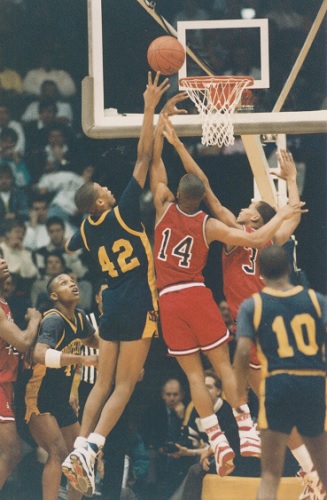 The 1995 Class A final wrapped the amazing run as No. 1-ranked Flint Northern, powered by Mateen Cleaves’ game-leading 28 points and Antonio Smith’s 24 points and 15 rebounds, decimated No. 2 Pershing, 86-64 before a crowd of 11,179 at the Breslin Center. Northern had trailed 44-37 at the half.
The 1995 Class A final wrapped the amazing run as No. 1-ranked Flint Northern, powered by Mateen Cleaves’ game-leading 28 points and Antonio Smith’s 24 points and 15 rebounds, decimated No. 2 Pershing, 86-64 before a crowd of 11,179 at the Breslin Center. Northern had trailed 44-37 at the half.
It was Northern’s first title since 1978. It would also be the program’s last. The introduction of “school of choice” in Michigan in 1996, combined with plunging birth rates in the U.S. that peaked in 1978, meant upheaval in enrollment across the state’s public schools. In Flint, declining enrollment – also impacted by the pending closure of a massive automotive manufacturing complex operated by General Motors known as “Buick City” – forced the closure of Central following the 2008-09 school year. Northern closed in 2013. Following the 2017-18 school year, Northwestern and Flint Southwestern merged, leaving Southwestern as the city’s lone high school.
In Detroit, Northern, Mackenzie, and Murray-Wright were among four high schools closed by the Detroit Public Schools in 2007 due to cost constraints and declining enrollments. Cooley was shuttered in 2010. Southwestern, dedicated in 1922, and Kettering, opened in 1965, both closed in 2012.
Of the 26 Class A title games waged between 1970 and 1995, Flint City Schools and the PSL teams each won nine of those contests. On 15 occasions, the championship game featured a match-up of Flint and Detroit PSL teams. On only seven occasions did schools from outside Wayne, Oakland, or Genesee counties ever crash the championship party. Saginaw High School ended with runner-up honors in 1973, 1976, and 1990, with Lansing and Benton Harbor High Schools being the only others.
Parade of Talent
Basketball junkies attending title games during those years watched an incredible collection of talent come out of those teams from Flint, the PSL and metropolitan Detroit during the span.
On the coaching side:
► Frieder ended up as head coach at Michigan with the 1980-81 season, then Arizona State in 1989.
► Gooch compiled over 400 varsity wins and 86 JV victories during his time at Flint Central.
► Kirkland ended his basketball coaching career in 2000 as Flint’s all-time winningest varsity coach, compiling a 518-148 mark. His Wildcats compiled 60-straight wins between January 1984 and February 1986 and presently rank No. 3 in consecutive wins in state history. In 2020, Detroit Free Press writer Mick McCabe named Northwestern’s 28-0 team from 1985 as the greatest boys basketball team he covered in his 50 years of reporting.
► Southwestern’s Watson served as an assistant at Michigan for two seasons, then guided the men’s basketball team at the University of Detroit Mercy from 1993 to 2008, compiling a 258-185 record over 15 seasons.
► Kelso, a Flint Southwestern graduate who did not play high school basketball but ended up as the all-time scorer at Central Michigan when he graduated in 1973, would be a finalist for the head coaching spot at CMU in 1997. At Cooley from 1984 through 1998, he later served as an assistant basketball coach at Kansas State in 2005-06.
► Kettering’s Charles Nichols, on hand since the school opened, coached tennis, football, and track during his first years at the school. With the 1970-71 season, he took over basketball coaching duties from Walt Jenkins, guiding the team for four campaigns. In December 1974, he joined Dick Vitale’s coaching staff at the University of Detroit for parts of two seasons. He returned to Kettering in 1978 as athletic director, then later served as assistant director of the PSL until his retirement in 2002.
The players included:
Flint
► Central’s Eric Turner, Marty Emery, Mark Harris, Keith Gray, Terence Green, and Darryl Johnson.
► Northern’s Terry Furlow, Dennis Johnson, Gary Pool, Antonio Smith, and Mateen Cleaves.
► Northwestern’s James Person, Jeff Grayer, Glen Rice, Andre Rison, Anthony Pendleton, and Daryl Miller.
Detroit PSL
► Cass Tech’s Tony Jamison and William Mayfield.
► Cooley’s Yamen Sanders, Earl Stark, Rafael Peterson, Michael Talley, and Daniel Lyton.
► Kettering’s Lindsay Hairston, Joe Johnson, Eric Money, and Coniel ‘Connie’ Norman.
► Mackenzie’s Steve Caldwell and Dave Traylor.
► Murray-Wright’s Willis Carter and Robert Traylor.
► Northern’s Katu Davis and Leonard Bush.
► Pershing’s Phil Paige, Robert Hawkins, Calvin Harper, Willie Mitchell, Carlos Williams, Todd Burgan, and Winfred Walton.
► Southwestern’s Darryl Robertson, Antoine Joubert, Clarence Jones, Sam Sillmon, Tarence Wheeler, Anderson Hunt, Loren Clyburn, James Hunter, Jalen Rose, Voshon Lenard, and Howard Eisley.
Metro Detroit
► Birmingham Brother Rice’s Will Franklin, Kevin Smith, and Tim Andree.
► Detroit Catholic Central’s Mike Prince and David Abel.
► Highland Park’s Terry Duerod, Percy Cooper, and Renardo Brown.
► Pontiac Central’s brothers Campy, Larry and Walker D. Russell; Larry Cole, Tim Marshall, and Clyde Corley.
► Romulus’s Terry Mills, and Stevie Glenn.
 Ron Pesch has taken an active role in researching the history of MHSAA events since 1985 and began writing for MHSAA Finals programs in 1986, adding additional features and "flashbacks" in 1992. He inherited the title of MHSAA historian from the late Dick Kishpaugh following the 1993-94 school year, and resides in Muskegon. Contact him at [email protected] with ideas for historical articles.
Ron Pesch has taken an active role in researching the history of MHSAA events since 1985 and began writing for MHSAA Finals programs in 1986, adding additional features and "flashbacks" in 1992. He inherited the title of MHSAA historian from the late Dick Kishpaugh following the 1993-94 school year, and resides in Muskegon. Contact him at [email protected] with ideas for historical articles.
PHOTOS (1) Detroit Cooley's Rafael Peterson (24) and Benson Maurice match up with Flint Northwestern's Archie Munerlyn (53) and Reggie Richardson during the 1988 Class A Final. (2) The Class A/Division 1 championship has been won by teams across the southern half of the Lower Peninsula over the last 25 years. (3) Grover Kirkland, here in 1975, built Flint Northwestern into a power. (4) Detroit Southwestern's Jalen Rose (42) and Cooley's Michael Talley (14) work to grab a loose ball during the 1989 Class A Final. (Photos courtesy of the Detroit News [1] and Gary Shook [4], or collected by Ron Pesch.)

